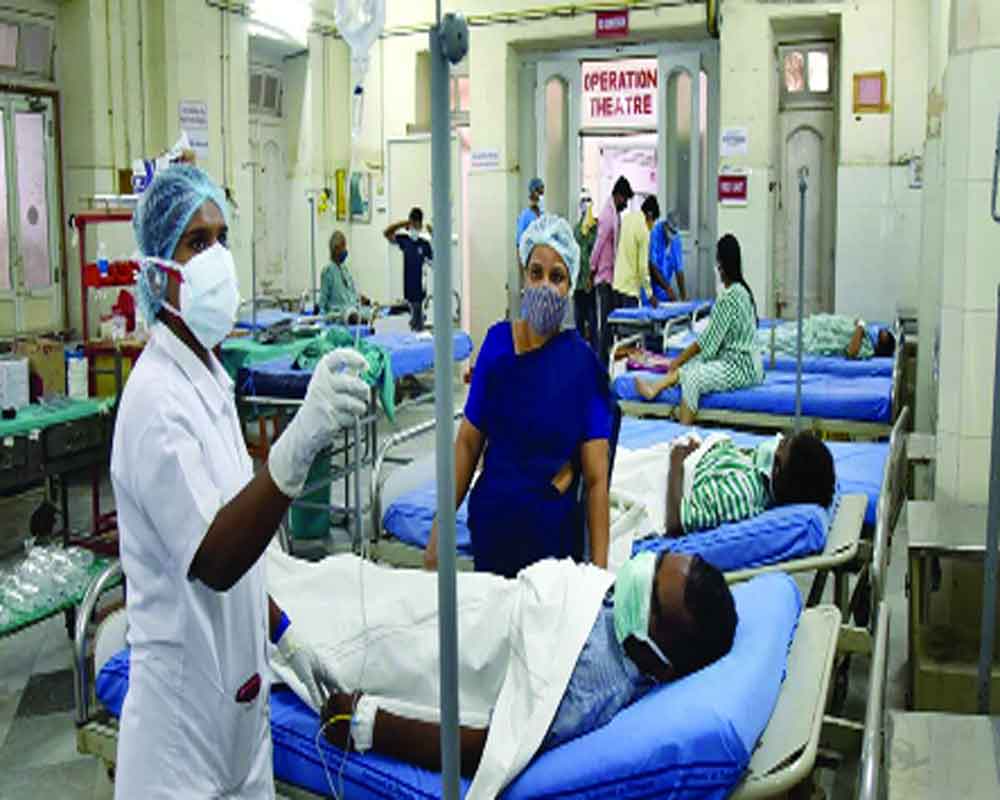Antimicrobial resistance stewardship programs have to be prioritized, keeping the demands of the continuing Covid-19 pandemic in context
On March 11, 2020, the World Health Organization (WHO) declared COVID-19, the disease caused by the SARS-CoV-2 virus, a pandemic. Two years later, the shadow of the Covid pandemic is still looming over us. While the world is making valiant attempts to move into the post-pandemic phase, the situation is akin to “one step forward, two-step backwardâ€, as new variants of this virus are still emerging.
Covid-19 has taken center stage in every facet of life. Policymakers and medical personnel are still caught up in the overwhelming task of fire-fighting and number crunching of Covid cases, deaths, and vaccinations. Hence, it is not entirely surprising that the mounting shadow of another future global crisis is not being given enough focus. Antimicrobial resistance caused by microbes which are silently and surreptitiously gaining power by getting resistant to most drugs, was already a global concern even before the Covid pandemic had arrived. That was evident by the fact that the WHO had named it a global priority for public health for the year 2020. Antimicrobial resistance is caused naturally but is compounded due to overuse of antibiotics, non-compliance with antibiotic doses, improper dumping of untreated chemicals from factories and hospitals in the environment, random dosing of antibiotics to livestock, and excessive spraying of pesticides on crops.
It had been estimated that more than one million deaths were occurring every year due to antibiotic-resistant infections in the world. It was expected that by the year 2050, this number would escalate ten times. It was already agreed upon that the time bomb of antimicrobial resistance was ticking, and there need to be urgent, global efforts to diffuse the impending doom. Hence, the fact that several bacteria were outsmarting the conventional antibiotic mode of action had set the alarm bells ringing long before the ill-timed SARS-COV-2 made its appearance. The fear of the impending nose-dive into the ‘pre-antibiotic’ era in the future had forced researchers to look for urgent and alternative drug therapy for persistent and resistant bacterial infections. There was a global effort to prioritize the antibiotic stewardship program to make sure that infections are being treated as per the need and demand.
Amidst this disquieting scenario, came the Covid-19 pandemic in 2019, flipping the best well-laid plans on their head. It not only claimed lives and damaged the economy but also derailed the global efforts being made to combat antimicrobial resistance.
The panic created by the raging pandemic led to the breakdown of planning and diversion of manpower and financial assets for the timely and urgent response to
COVID-19, leading to reduced output of laboratories due to deployment of healthcare personnel to the front lines for fighting the Covid pandemic. As a result, testing and monitoring of antibiotic resistance among various strains slowed down.
The unexpected emergence of this pandemic had caught the healthcare system by surprise. That led to increased hospitalization, shortage of protective equipment, long hospital stays, increased mortality, and the resultant secondary bacterial infections in Covid patients. It has been estimated that approximately70 percent of Covid-19 patients received antibiotic therapy. In most cases, the symptoms of Covid-positive patients and those of pneumonia caused by other viruses and bacteria have been similar and hard to discriminate. Also, getting infected with SARS-COV-2 further weakens the immune system, leading to more proliferative outbreaks of infections by opportunistic bacteria and fungi. At times, the delay in testing for Covid-19, especially when the pandemic was raging among populations led to indiscriminate prescribing of antibiotics upon onset of symptoms of respiratory tract infections. The problem was further compounded by lockdowns all over the world, due to which many people were not able to access the much-needed health care systems. That led to inappropriate and unnecessary self-medication with antibiotics. Several immunization programs were halted or derailed due to the pandemic, leading to outbreaks of diseases caused by drug-resistant bacteria, which had been kept at bay so far.
The global efforts to combat the Covid pandemic have given an example of how the joint, proactive efforts from all the nations singularly aimed at fighting a health menace can work spectacularly. There is an urgent need to prioritize antimicrobial resistance stewardship programs with renewed vigor and a revised course of action, keeping the demands of the still ongoing pandemic in context. The antibiotic stewardship program needs to be updated and monitored for all health care systems. Additionally, the drug pipeline for new antibiotics needs to be refurbished at all levels, beginning from basic laboratories to pharmaceutical companies.
(The writer is a Protein Structural Biologist, professor, at the AIIMS, Delhi, and author. The views expressed are personal.)


























